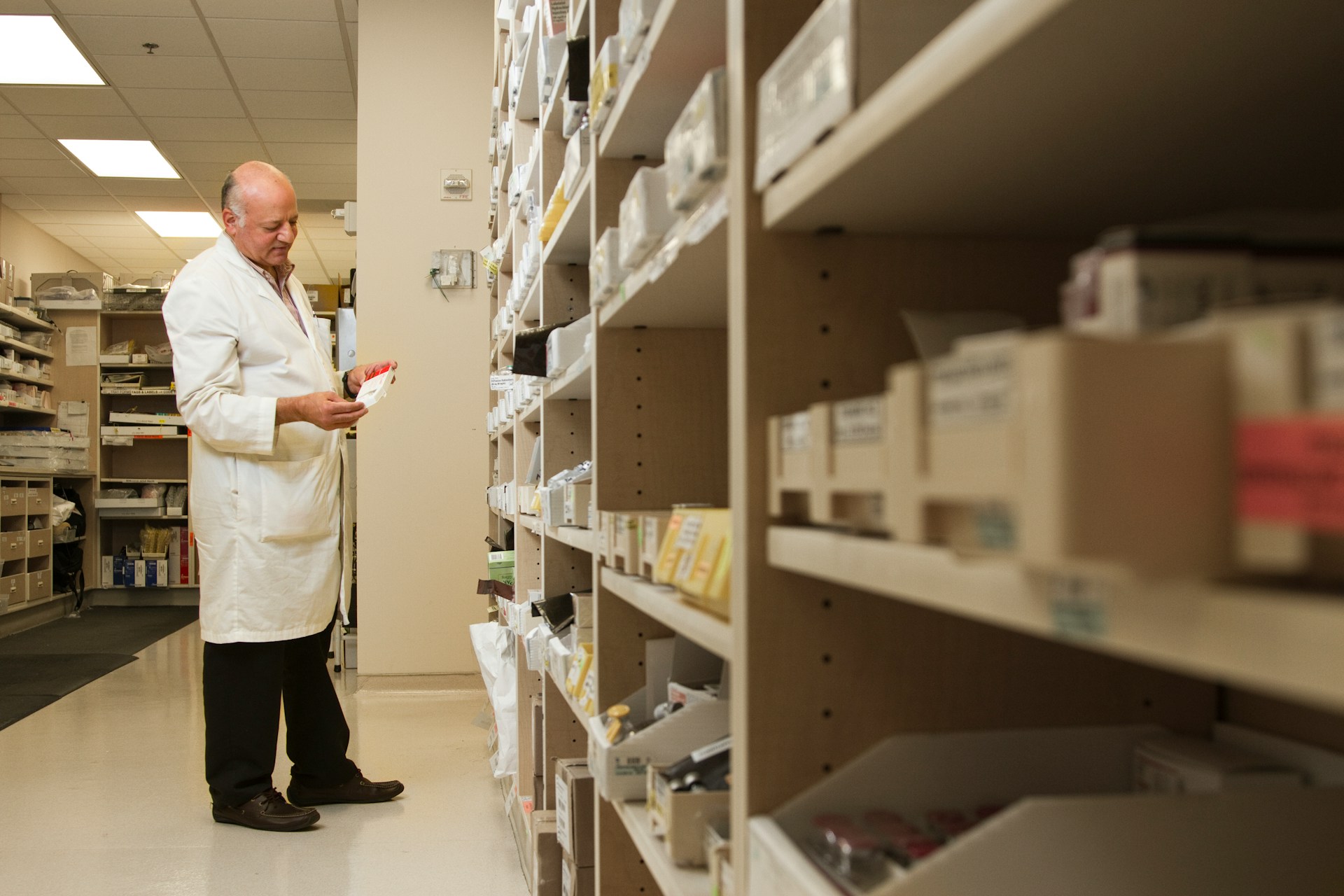Article
The Importance of a Cyber Security Plan for Pharma Companies
31 Jul, 202410 minutes
The threat of cyber attacks intensifies as the pharmaceutical industry becomes more dependent on digital technologies. With sensitive patient data, crucial research, and proprietary business strategies at risk, a solid cyber security plan is a must. Protecting client confidentiality, maintaining regulatory compliance, and safeguarding a company's reputation are critical priorities.
Pharma companies face various cyber security threats, including phishing, ransomware, and data breaches. If not properly managed, these threats can lead to significant financial losses, legal ramifications, and damage to a company's reputation.
In this guide, we'll explore why a solid cyber security plan is vital for pharma businesses. We'll highlight its role in defending against cyber threats, providing strategies to secure your organization, and ensuring your reputation remains untarnished.
Why Pharma Companies Are Prime Targets for Cyber Security Issues?
Cyber security is a significant concern for the pharmaceutical industry, especially in regions like New York, where numerous pharmaceutical companies and research institutions are concentrated. These organizations face increasing threats from cybercriminals due to the high value of their intellectual property and the sensitive nature of the data they manage.
In the section below, let's examine why pharma companies are prime targets.
Valuable Intellectual Property
Pharmaceutical companies handle critical intellectual property, including proprietary drug formulas, clinical trial data, and research outcomes. This intellectual capital represents years of research and development investment, making it a primary target for cyber attacks aimed at economic gain or disrupting competitive advantage.
Sensitive Patient Data
Besides intellectual property, these firms manage extensive databases containing sensitive patient information, such as medical records and personal details. Cybercriminals highly seek after this data for identity theft, financial fraud, or resale on the black market, requiring stringent pharmaceutical security measures to comply with regulatory standards and protect patient privacy.
Financial Incentives
The industry's substantial financial stakes make it attractive for cyber extortion through ransomware attacks, which can potentially lead to significant economic losses and reputational damage.
Technological Complexity
Adopting advanced technologies, such as Internet of Things (IoT) devices, cloud computing, and big data analytics, enhances operational efficiency and expands the attack surface for cyber threats.
Securing these interconnected systems is essential to maintaining operational integrity and safeguarding sensitive information from unauthorized access.
The Current Impact of Cyber Attacks on the Pharma Industry
Despite regulatory safeguards such as HIPAA and FDA guidelines, the pharmaceutical industry faces an escalating threat from cyber attacks. The sector's reliance on valuable data and rapid adoption of digital technologies make it a prime target for malicious actors.
Pharma companies in the U.S. encounter various threats, including:
- Ransomware Attacks: In 2017, Merck suffered a devastating attack that led to over $300 million in losses, disrupting operations and demanding significant ransom payments. Similarly, Bayer was affected by the WannaCry ransomware attack, causing disruptions in production and administration due to widespread infections.
- Phishing Scams: These scams exploit human error to access sensitive information, posing ongoing risks across the industry.
- Data Breaches and Intellectual Property Theft: In 2020, Moderna, involved in COVID-19 vaccine development, reported attempts by nation-state groups to steal intellectual property related to its vaccine research. The incident highlighted the persistent threats to sensitive research data.
- Supply Chain Attacks: While a pharma company may plan for cyber attacks and prepare as much as possible, its third-party connections can often leave it open to threats when it is attacked.
- Insider Threats to Security: Organizations can be left vulnerable to their own internal staff and practices. Internal team members of investors can jeopardize security operations intentionally or through negligence if they are not trained on pharmaceutical security measures.
The Persistent Challenge
Many cyber incidents go unreported to avoid damaging corporate reputation despite the significant financial and operational impacts affected companies face.
While pharma regulations like HIPAA and FDA guidelines tighten, budget constraints often limit comprehensive cyber security plan investments in the pharma sector. This imbalance leaves organizations vulnerable to cyber threats.
In response, pharma companies increasingly prioritize cyber security plans to protect data, adhere to regulations, and maintain public trust. Strengthening defenses against cyber threats is crucial as regulatory scrutiny increases and global data protection standards evolve, but there is still more to do.
Understanding these challenges highlights the critical need for pharmaceutical companies to implement specific cyber security strategies. By proactively addressing these issues, companies can protect their intellectual property, secure patient data, and ensure the reliability of their operations in the face of developing cyber threats.

5 Strategies to Ensure Cyber Security Success in Your Pharma Organization
Now that we've explored pharmaceutical companies' primary challenges with cybersecurity breaches, let's explore how to optimize your security strategies to ensure compliance with regulatory requirements in the following section.
Strategy 1: Establish a Cyber Security Framework
With regulatory requirements for data protection rising, your organization must implement a cyber security framework that ensures compliance and safeguards your interests. Protecting your sensitive data—such as trial data, formulas, and patient information—is critical for maintaining smooth operations and securing stakeholder trust.
Cyber security incidents disrupt operations in half of all pharmaceutical companies. While federal and state regulations provide guidelines on data storage, relying solely on compliance can leave your organization vulnerable to other threats. That's why a comprehensive cyber security plan tailored to the pharmaceutical sector is essential.
To guide your efforts, consider aligning your practices with well-established cyber security frameworks like the NIST cyber security Framework (CSF), which offers a structured approach to improving cyber security.
Another option is ISO/IEC 27001, which outlines requirements for establishing and maintaining an information security management system. The CIS Controls also provide a prioritized set of actions to help protect your organization from cyber threats.
You should design a personalized cyber security framework that includes:
- Risk assessment and management
- Data protection through encryption
- Strict access controls and authentication measures
- Secure endpoint and network security
- Phishing prevention through employee training
- Compliance with regulations like HIPAA and GDPR
- Continuous monitoring and auditing
- Secure software development practices
- Regular backups
- Strong leadership and governance support
Use this list as a starting point, but be sure to customize your cyber security plan to fit your specific needs and organizational operations. Establishing a clear cyber security framework will help protect your valuable data and maintain the trust of your stakeholders.
Strategy 2: Do you need to Expand Your Team?
Assessing whether to expand your cyber security team in the pharmaceutical industry involves thoroughly evaluating your current capabilities, comparing them with industry benchmarks, and staying updated on regulatory requirements. Cyber security often receives insufficient attention in an industry where innovation and healthcare standards take precedence.
Surprisingly, only 32% of pharmaceutical companies have sizable dedicated cyber security teams, despite the increasing risks posed by cyber threats and the critical need to protect sensitive data.
To ensure your organization is prepared and resilient in terms of cyber security, consider these steps:
Evaluate Your Current Team
Start by assessing your existing cyber security team. Look at their skills and capabilities to handle the growing complexity and volume of cyber threats. Also, consider their workload—can they manage current responsibilities effectively, or do they need additional support?
Identify Gaps
Determine where your cyber security plan may be lacking. Are specific areas like incident response, compliance with data protection laws, or overall cyber security policies requiring specialized expertise? Recognizing these gaps is important for determining where to allocate additional resources.
Benchmark Against Industry Standards
Compare your cyber security practices with what is standard in the pharmaceutical sector. This comparison helps gauge how your pharmaceutical security measures measure up against peers. Are other companies investing more in cyber security resources or implementing more advanced practices?
Stay Compliant with Regulations
Keep informed about regulatory requirements specific to cyber security in pharmaceuticals. Are there new mandates or standards emerging that require additional expertise or particular roles within your cyber security team? Compliance is essential not just for avoiding penalties but also for safeguarding your organization from potential cyber risks.
By conducting a thorough assessment and considering these factors, you'll better understand whether expanding your cyber security team is necessary. Once you have looked at the current gaps in your team, you should be recruiting for key roles that reflect your needs.
Here are some essential roles that should be considered in your team:
- Chief Information Security Officer (CISO): Oversees cyber security plan and operations, ensuring alignment with organizational goals and regulatory requirements.
- Security Operations Center (SOC) Manager: This person manages daily SOC activities, including monitoring, incident response, and coordination with internal teams.
- Data Protection Officer (DPO): This person ensures compliance with data protection laws, implements policies, and serves as a contact point for data privacy matters.
- IT Security Architect: Designs secure IT infrastructures, conducts risk assessments, and integrates pharmaceutical security measures into systems and applications.
- Security Analysts and Engineers: Monitor systems for security incidents, implement security controls, and conduct assessments to mitigate vulnerabilities.
- Compliance Officer: Oversees cyber security compliance efforts, develops programs, and conducts audits to ensure adherence to regulatory standards.
- Incident Response Team: This team coordinates responses to cyber security incidents, implements incident management plans, and facilitates recovery efforts.
Check out our guide on building a robust cyber security team to learn more about assembling a team that can deal with any threat.

Strategy 3: Implement Strong Access Controls and Data Encryption
Access controls and data encryption are crucial elements of your cyber security strategy, especially in the pharmaceutical industry, where regulatory compliance and safeguarding sensitive information are paramount.
Larger pharmaceutical organizations typically implement these measures on a broader scale to strengthen defenses against cyber threats, meet regulatory obligations, protect patient confidentiality, and build trust with stakeholders.
Chances are, if you're part of a larger pharmaceutical organization, you're already familiar with these security basics. However, ensuring these practices are finely tuned and up-to-date is key.
Let's explore how you can effectively implement and optimize these pharmaceutical security measures at a basic level to ensure you are covering everything:
Role-Based Access Control (RBAC)
Getting access right is crucial in pharma. Fine-tuning RBAC means giving your teams access to precisely what they need—whether it's researchers accessing their data or clinicians managing patient records. Regular checks keep permissions aligned with changing roles and regulations, preventing unauthorized access and protecting sensitive information.
Multi-Factor Authentication (MFA)
Passwords alone aren't enough to protect sensitive information. MFA adds an extra layer of security by requiring more than one form of verification, such as fingerprints, tokens, or other methods. This simple step significantly reduces the risk of unauthorized access, keeping your data safe from cyber threats and breaches.
Advanced-Data Encryption
Encryption is your digital lockbox in pharma. Using strong encryption standards for databases and data transmissions ensures that sensitive information remains unreadable to unauthorized users. Encrypting data at rest and in transit protects patient records, research data, and intellectual property, ensuring compliance and safeguarding against data breaches.
Privileged Access Management (PAM)
It is important to manage who can access critical systems and data. PAM controls and monitors privileged accounts closely, enforcing strict access rules and tracking activities. Regular audits and vigilant monitoring help detect and prevent insider threats and unauthorized access attempts, maintaining pharmaceutical data integrity and confidentiality.
Logging and Monitoring
Keeping an eye on access and activities in real time is essential for spotting and responding to potential security threats swiftly. Monitoring access attempts, detecting unusual behavior, and analyzing security logs help you stay ahead of cyber risks and comply with regulations like HIPAA.
Monitoring access and encrypting sensitive data in accordance with federal pharmaceutical regulations protects your organization and builds a culture of security awareness and responsiveness.
Strategy 4: Develop and Test Incident Response and Vulnerability Management
When it comes to cyber security in the pharma industry, it’s not enough to set it and forget it. Cyber threats constantly evolve, so you must proactively identify and fix vulnerabilities that could put your data and operational capacity at risk.
No matter the size of your trial programs or the number of professionals on your team, strategies can only be solid if you learn from potential vulnerabilities and address them. Essentially, the future of your pharmaceutical company depends on how well the cyber security plans that have been enforced can be maintained and monitored, as well as how your teams react to targeted incidents.
If you test your system’s security and your team’s ability to react to developing situations, the likelihood of breaches and attacks being successful decreases. You should conduct regular assessments and penetration tests to uncover vulnerabilities before cybercriminals do. It's like giving your tech a regular check-up to stay one step ahead.
Popular incident testing frameworks, like the NIST Incident Response Plan, typically follow the same structure: preparing, detection, containment, and learning. Here are our top tips for actioning this effectively:
- Define Objectives and Scope: Clearly outline the goals and scope of your incident response plan, specifying the types of incidents it will cover and the critical assets it aims to protect, such as patient data and research.
- Formulate an Incident Response Team: Identify and assemble a multidisciplinary team, including IT security experts, legal advisors, communications specialists, and senior management, to ensure comprehensive coverage and swift decision-making during incidents.
- Develop Clear Procedures: Create detailed procedures outlining how to detect, analyze, contain, eradicate, and recover from cyber security incidents. These procedures should be well-documented and accessible to all team members.
- Establish Incident Classification: Implement a system for classifying incidents based on severity and impact to prioritize response efforts effectively. This classification helps allocate resources appropriately and manage incidents in a structured manner.
- Continuous Improvement: Periodically review and update your incident response plan in response to emerging threats, regulatory changes, and lessons learned from past incidents.
- Act Fast, Minimize Impact: Respond swiftly to cyber incidents. On average, pharmaceutical companies take up to 257 days to identify a breach and 66 days to contain it. Acting fast can significantly reduce these times.
Implementing these steps will help ensure your pharmaceutical organization is well-prepared to respond to cyber security incidents swiftly and effectively, minimizing potential harm and maintaining operational resilience.
Robust Cyber Security Plans for Pharma Success: Final Thoughts
In the high-stakes world of the pharmaceutical industry, especially in pharma hubs like New York, robust cyber security plans are no longer optional—they're essential. With sensitive data like patient information and valuable intellectual property at risk, pharma companies must prioritize cyber security to protect against developing cyber threats.
Implementing a tailored cyber security framework, enhancing employee awareness through regular training, and utilizing advanced technologies are critical steps. Regular security assessments and strong incident response plans will ensure these companies can continue their vital work without disruption.
These proactive measures allow pharmaceutical firms to safeguard their data, maintain regulatory compliance, and protect their reputation in an increasingly digital world. As cyber threats grow more sophisticated, continuous improvement in cyber security practices will remain crucial for the industry's future.
Fueling Industry Talent Connections in Pharma and Tech
At McGregor Boyall, we understand the critical importance of maintaining pharmaceutical data integrity and adhering to pharma regulations in your cyber security strategy. We specialize in connecting top-tier tech professionals with pharmaceutical companies, ensuring your cyber security team is equipped to protect sensitive data and meet compliance requirements.
Contact us today to discover how we can help you find the skilled tech professionals your organization needs to strengthen its cyber security efforts.



